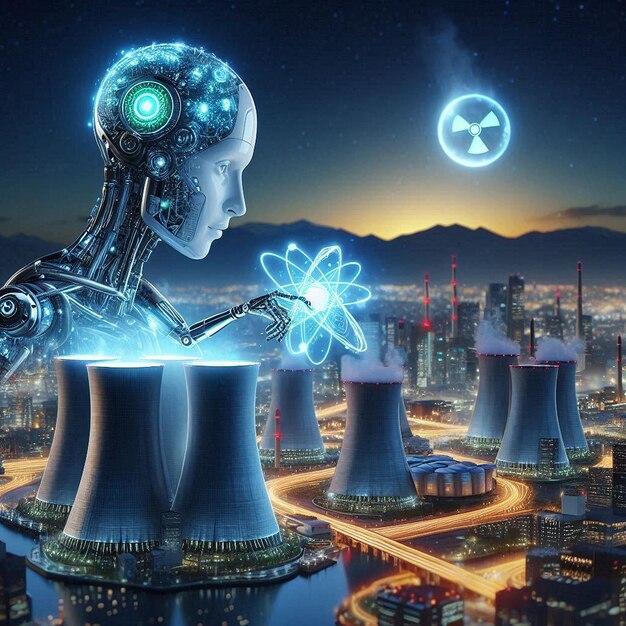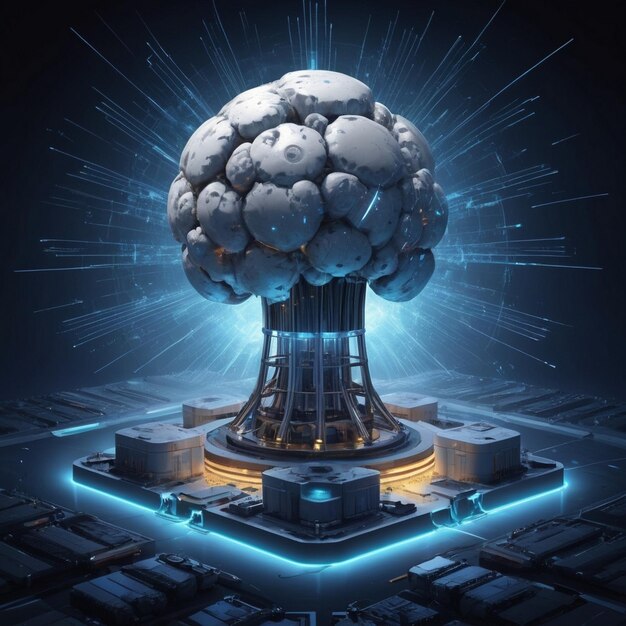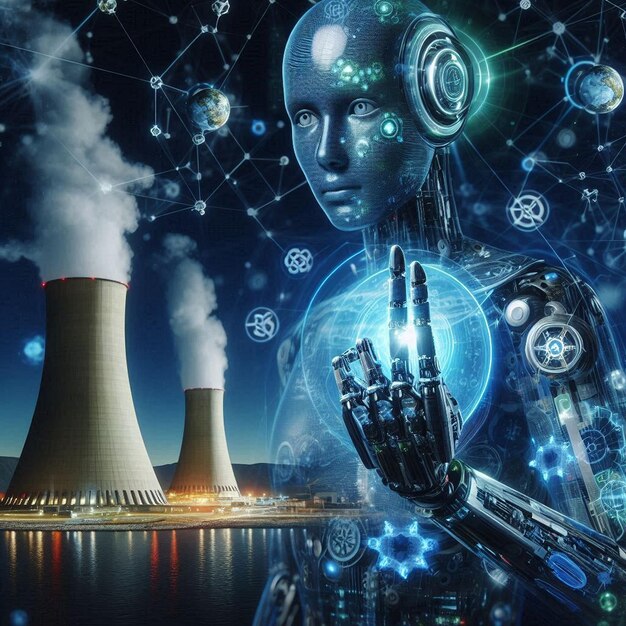The Intersection of AI and Nuclear Energy: A New Era of Efficiency and Safety?
Artificial Intelligence (AI) and nuclear energy, two technologies that have long been shaping the future of power generation, are now intersecting in a way that promises to bring about unprecedented levels of efficiency and safety.
Revolutionizing Nuclear Energy with AI
The integration of AI in nuclear energy is revolutionizing the way power plants are managed and operated.
Predictive Maintenance
With AI’s ability to analyze vast amounts of data, nuclear power plants are now able to implement predictive maintenance. This means that potential issues can be identified and addressed before they cause any damage, significantly reducing downtime and increasing the overall efficiency of the plant.
Improved Safety
Safety is another area where AI is making a significant impact. By monitoring and analyzing real-time data from sensors, AI systems can detect anomalies that could indicate potential safety issues.
Optimizing Energy Production
Moreover, AI is helping to optimize energy production by forecasting electricity demand and adjusting power generation accordingly. This not only reduces wastage but also ensures a stable power grid.
The Future of Nuclear Energy with AI
With the potential benefits of integrating AI in nuclear energy, it’s clear that this is a relationship worth exploring further.
Reducing Carbon Emissions
As the world moves towards reducing carbon emissions, AI’s ability to optimize energy production and reduce wastage in nuclear power plants is becoming increasingly important.
Addressing Public Concerns
Moreover, the use of AI in nuclear energy can help address public concerns regarding safety and efficiency. By providing real-time data and analysis, stakeholders can be assured that the plants are being managed effectively and efficiently.
Conclusion
In conclusion, the intersection of AI and nuclear energy is opening up a new era of efficiency and safety in power generation. As the world continues to seek sustainable energy solutions, this relationship will only become more important.

Introduction
Nuclear energy, a low-carbon and reliable source of electricity, plays a significant role in the global energy production landscape. It accounts for approximately 10% of the world’s electricity generation, making it a vital contributor to meeting the world’s growing energy demands while reducing greenhouse gas emissions. However, the nuclear energy sector faces several challenges: ensuring safety, managing costs, and dealing with public perception. On the other hand, Artificial Intelligence (AI) has emerged as a transformative technology in various industries, offering numerous benefits and challenges.
Nuclear Energy: Significance and Challenges
Nuclear energy‘s importance can be attributed to its ability to generate large amounts of electricity continuously without producing greenhouse gases. However, the Fukushima disaster in 2011 highlighted safety concerns, leading to increased scrutiny and stricter regulations. Additionally, the high initial capital costs of nuclear plants make them financially unattractive compared to other energy sources like natural gas or renewables. Lastly, public perception remains a significant challenge, with concerns over safety and nuclear waste disposal continuing to deter investment in this sector.
Artificial Intelligence: Benefits and Challenges
AI, a subset of computer science that deals with creating intelligent machines capable of learning, reasoning, and self-correction, has shown great promise in various industries. Its applications range from self-driving cars, virtual personal assistants, and predictive maintenance to fraud detection and healthcare diagnosis. However, the adoption of AI also comes with challenges: ethical considerations, potential job displacement, and privacy concerns.
Thesis Statement:
Despite the challenges faced by both nuclear energy and AI industries, the integration of AI into nuclear energy systems holds the potential to address existing challenges, increase efficiency, and ensure safety. By implementing AI in areas like predictive maintenance, plant optimization, and safety systems, the nuclear energy sector can mitigate safety concerns, reduce costs, and improve public perception.
Conclusion
In conclusion, the future of nuclear energy and AI lies in their synergistic relationship. By leveraging AI’s capabilities, the nuclear energy sector can transform its operations, ensuring a safer, more cost-effective, and more socially acceptable future for this essential low-carbon electricity source.

AI Applications in Nuclear Energy: An Overview
Predictive Maintenance using Machine Learning Algorithms
Condition monitoring of equipment and structures: AI is revolutionizing the way nuclear energy facilities maintain their critical infrastructure. With machine learning algorithms, real-time analysis of sensor data can be performed to detect anomalies and potential failures in nuclear equipment before they occur.
Optimization of maintenance schedules: Predictive maintenance is a game-changer for the nuclear industry, allowing facilities to schedule maintenance based on data instead of time. By analyzing the condition of equipment and predicting potential failures, maintenance schedules can be optimized for maximum efficiency and minimal downtime.
AI in Nuclear Power Plant Operations and Control Systems
Real-time monitoring and adjustment to ensure optimal performance: AI plays a crucial role in ensuring the optimal performance of nuclear power plants. By monitoring critical parameters such as temperature, pressure, and other conditions in real-time, AI systems can make adjustments to keep the plant running at peak efficiency.
Improving reactor stability and safety: AI also helps to improve the stability and safety of nuclear reactors. By analyzing data from sensors and other sources, AI systems can detect anomalies and take corrective action before they become critical.
AI in Fuel Cycle Management
Optimizing fuel utilization for maximum efficiency: AI is being used to optimize fuel utilization in nuclear power plants, minimizing waste production and maximizing energy output. By analyzing data from the fuel cycle process, AI systems can identify areas where improvements can be made to increase efficiency.
Enhancing nuclear waste management and disposal strategies: AI is also being used to improve nuclear waste management and disposal strategies. By analyzing data from the fuel cycle process, AI systems can help identify the best methods for storing and disposing of nuclear waste in a safe and efficient manner.
AI in Radiation Monitoring and Protection
Real-time detection of abnormal levels of radiation: AI is being used to detect abnormal levels of radiation in real-time. By analyzing data from sensors and other sources, AI systems can alert operators to potential issues and take appropriate action to ensure the safety of plant personnel and the environment.
Improving shielding designs for safer containment of radioactive material: AI is also being used to improve the design of nuclear reactor shielding. By analyzing data on radiation levels and containment effectiveness, AI systems can help designers create safer and more effective shielding for nuclear facilities.

I Case Studies: Successful Implementation of AI in Nuclear Energy Systems
Examples from Leading Nuclear Energy Companies and Research Institutions:
- Westinghouse Electric Company:
- France’s Électricité de France (EDF):
- Argonne National Laboratory:
Westinghouse Electric Company, a leading nuclear power plant manufacturer and service provider, has been at the forefront of implementing AI technology for predictive maintenance. By analyzing data from sensors and historical records, their AI system can identify patterns and anomalies that may indicate impending equipment failures. This allows for timely repairs and maintenance, reducing downtime and improving plant efficiency.
Électricité de France (EDF) , the French national electric utility company, has implemented AI in reactor optimization. Their system analyzes real-time data from various sensors to optimize power output and fuel usage. This results in increased efficiency, reduced greenhouse gas emissions, and improved safety.
Argonne National Laboratory, a leading research institution in the U.S., is conducting research on AI-assisted fuel cycle management. Their system uses machine learning algorithms to optimize nuclear fuel utilization, improve safety, and reduce waste generation. This innovation could significantly impact the economics of nuclear energy production and contribute to a more sustainable energy future.
Key Takeaways and Lessons Learned from These Case Studies:
- Significant Improvements in Efficiency, Safety, and Cost Reduction:
- Challenges Faced During Implementation and Potential Solutions:
The successful implementation of AI technology in nuclear energy systems has led to significant improvements in efficiency, safety, and cost reduction. Predictive maintenance, reactor optimization, and fuel cycle management are just a few examples of how AI can be used to enhance the performance of nuclear power plants.
Despite the numerous benefits of implementing AI in nuclear energy systems, challenges remain. Data security and privacy concerns are significant given the sensitive nature of the data being processed. Another challenge is ensuring the compatibility of AI systems with existing infrastructure and regulatory requirements. To address these challenges, ongoing research and collaboration between industry experts, technology companies, and regulators is essential.

The Future of AI in Nuclear Energy:
Opportunities and Challenges
Advancements in Technology and Research
Improvements in AI Algorithms for Nuclear Applications:
Advancements in Artificial Intelligence (AI) algorithms are revolutionizing various industries, and the nuclear energy sector is no exception. The application of AI technologies like deep learning, reinforcement learning, and others, in nuclear energy can lead to significant improvements. Deep learning algorithms can be used for anomaly detection and predictive maintenance, while reinforcement learning can optimize plant operations and fuel management.
1.1 Integration of Other Advanced Technologies
Moreover, the integration of other advanced technologies with AI in nuclear energy is a promising trend. For instance, quantum computing can accelerate simulations and optimize complex nuclear processes. Similarly, the use of edge computing in AI applications can enhance the speed and efficiency of data processing at the edge of the network, reducing latency and improving response times.
Ethical Considerations and Potential Risks
While the integration of AI in nuclear energy holds immense promise, it also raises several ethical considerations and potential risks.
Ensuring Transparency and Accountability in AI Decision-making
Firstly, it is crucial to ensure transparency and accountability in the decision-making of AI algorithms used in nuclear energy. This includes mitigating biases in AI algorithms, which can lead to unfair or discriminatory outcomes.
Addressing Public Concerns Regarding Safety and Job Displacement
Secondly, there are public concerns regarding the safety of AI in nuclear energy and its potential impact on employment. Addressing these concerns is essential to build trust and support for the integration of AI in this sector.
Collaborations Between Academia, Industry, and Governments to Drive Innovation and Adoption
To drive innovation and adoption of AI in nuclear energy, collaborations between academia, industry, and governments are crucial. These partnerships can facilitate research and development efforts, as well as provide a platform for knowledge sharing and best practices exchange.

Conclusion
In the rapidly evolving world of energy production, Artificial Intelligence (AI) is poised to revolutionize nuclear energy systems. The potential benefits of integrating AI into nuclear energy are manifold.
Improved Efficiency, Safety, and Cost Reduction
AI can significantly enhance the performance of nuclear energy systems by providing real-time monitoring, predictive maintenance, and optimization capabilities. By analyzing vast amounts of data from sensors and simulations, AI can help prevent equipment failures, optimize fuel utilization, and reduce downtime. Moreover, it can improve safety by detecting anomalous behaviors and predicting potential hazards before they manifest. Lastly, AI’s ability to automate routine tasks can lead to substantial cost savings for nuclear energy providers.
Enhancing Public Perception and Trust in the Industry
As public concerns about nuclear energy persist, AI can help address these issues by promoting transparency and accountability. By providing real-time updates on plant performance, maintenance schedules, and safety protocols, AI can help build trust with the public. Furthermore, AI’s ability to learn from data and adapt to changing circumstances can lead to more responsive and resilient nuclear energy systems that are better suited to meet the needs of a rapidly changing energy landscape.
Call to Action for Continued Research, Development, and Implementation of AI in Nuclear Energy Systems
Despite these promising benefits, it is crucial to acknowledge that the integration of AI into nuclear energy systems is not without challenges. There are significant technical and regulatory hurdles that must be overcome to ensure the safe and effective implementation of AI in this context. Therefore, continued research, development, and collaboration between industry experts, regulators, and policymakers are essential to ensure that the potential benefits of AI in nuclear energy are fully realized. By working together to address these challenges, we can build a future where nuclear energy systems are safer, more efficient, and more trusted by the public.
